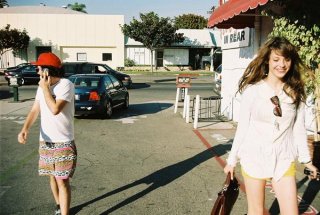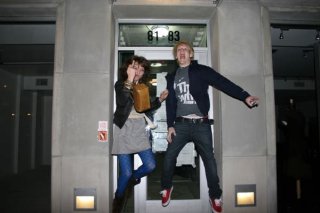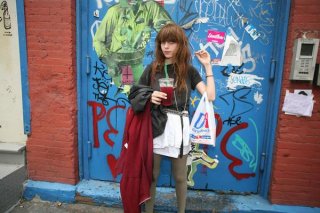DosViolines
far from home...
- Joined
- Aug 21, 2005
- Messages
- 3,212
- Reaction score
- 12
latimes
Part 1
Part 1
The secret life of Cory Kennedy
A photogenic teenager becomes an Internet celebrity and international style phenomenon before she's even 16. What's a mother to do?
By Shawn Hubler
Shawn Hubler is a senior writer for West.
February 25, 2007
In the summer of 2005, when she was 15 but not yet famous, Cory Kennedy went to a Blood Brothers concert at the El Rey Theatre. She remembers what she was wearing—black leg warmers, beat-up black Converse sneakers and a canary-yellow Lacoste mini-dress that she'd had to beg her mother to buy her. It was "back in the day," at the end of ninth grade, when she was still going by her full name, Cory Kennedy-Levin. She was going to a lot of concerts then, and at this one, a guy named the Cobra Snake saw her and took her picture for his hipster-party photo website.
In the non-Internet world, the guy's real name is Mark Hunter, and the scary nickname was mostly wishful thinking. Bright, friendly and energetic, Hunter was also young. A year or two's difference, and Cory might have recognized him as the 2003 Associated Student Body vice president at Santa Monica High School. After graduation, he had discovered a knack for taking pictures of L.A. nightlife, and he had been posting them for free on thecobrasnake.com, which was becoming a fairly popular website. Hunter, then 20, especially liked the El Rey because all sorts of interesting people went there, from movie stars to posses of L.A. teenagers like the pretty girl in yellow he saw that night out on the town.
That was how it started. That was the first flicker of what would become the—What? Phenomenon? Moment? Cautionary tale? Success story? Footnote?—of Cory Kennedy.
If it's hard to characterize, it may be because hers is a dispatch from uncharted cultural waters. Never before have media, technology and celebrity collided with adolescence at such warp speed. Never before has it been so easy for, say, a middle-class kid with a curfew and no driver's license to rise to international fame almost without her parents' knowledge.
Put it this way: By the time Cory Kennedy's mother realized that her child had become, in the words of Gawker.com, an "Internet It Girl," the Web was riddled with photos of Cory posing, eating, dancing, shopping, romping at the beach, looking pensive and French-kissing one of the (adult) members of the rock band the Kings of Leon. She had European fan sites. She had thousands of people signing on to her MySpace pages. She had fashion bloggers dissecting her wardrobe ("a cross between the Little Match Girl and the quintessence of heroin chic," one wag called her taste in fashion). She had people watchers from the Netherlands to Japan speculating about her life story. (Was she a junkie? A refugee from Hyannis Port?) She had designers begging her to wear their clothes and deejays offering her money to show up at their nightclubs. She had invitations to party with Paris Hilton and Lindsay Lohan.
She was living, in short, a teenager's dream and a parent's version of "Fear Factor." And the obvious questions—at least for her mother—were, "What happened? And how?"
"I still have no idea," half-jokes Jinx Kennedy, a rangy 56-year-old who, with husband Barry Levin, 63, runs a for-profit high school degree program. We're in her Santa Monica living room, a cozy space filled with overstuffed sofas and framed family photos. In the kitchen, a white board above the microwave reminds the Kennedy-Levin children to "do chores" and "make bed" and "return your breakfast tray to the kitchen." Sports schedules hang on the refrigerator next to the straight-A report card of Cory's youngest sister. The It Girl, her mother says, is in her room, enjoying her last hours of freedom before heading off to her new school.
"I didn't connect the dots," she says, sighing. "But I'm real connected now."
It's hard to overstate the speed with which the Internet can now make someone a cultural icon. A YouTube video, a flub on "American Idol," a stupid pet trick—virtually anything can become a fast track to celebrity. What that means is still working itself out; all that's clear is that it's become unbelievably easy to get and leverage attention. A nobody can become a somebody at a moment's notice, just because everybody is always watching everything.
Cory Kennedy became famous after the people who watched Hunter started watching her too. It was the late autumn of her sophomore year at Santa Monica High School. They had exchanged numbers that night at the El Rey. Hunter needed office help, and soon Cory and her best friend, Maggy Rogow—a senior at a private school that made "internships" a prerequisite for graduation—were doing after-school clerical work for Hunter two days a week.
Almost immediately, they wanted to tag along to the parties. Hunter had long taken female friends with him, but the friends were usually his age. True, there were times when Hunter himself was the most lifelike thing on the guest list. ("He makes it look like the best party in the whole wide world when it could be the worst one," Cory says, laughing.) But the events he shot were populated by hipsters in their 20s and 30s; sex, drugs and alcohol were like occupational hazards. When he finally succumbed to the interns' pleas, he was careful to get parental permission. (Jinx Kennedy confirms that his conscientiousness won her over.)
"It was kind of weird bringing underage people to the events," says Hunter, who gave them cameras and posted their work alongside his photos. "But they were part of the team."
Rogow, who is now a freshman at Hampshire College in Amherst, Mass., says the experience was intensely exciting. "We were the youngest people there, and we thought everyone was really cool," she remembers. Celebrities would show up—Adam Brody of "The OC," the female rock group the Like, those Kings of Leon—but the scene typically "came off a lot more wild than it was."
For Cory, however, the experience was life-altering. From the moment Hunter posted his first pictures of her, with her doe eyes and her brown hair asunder, it was clear that her childlike face, surrounded by all that L.A.-noir, had its own gravitational pull. Some of it may have been his presentation: One set of photos, posted in December 2005 under the cryptic title "JFK CORY KENNEDY," encouraged speculation that she came from the political family. The allure, too, might have been thecobrasnake.com, which was getting more than 10,000 unique visitors a day, a following of kids, scenesters, professional trend-spotters and celebrity gawkers that, in the next year, would more than double.
But mostly the reaction was simply to 15-year-old Cory as seen through the love-struck eyes of a 20-year-old who couldn't stop looking at her. "She was totally real," Hunter says, "and totally innocent."
Of course, no muse is ever quite that simple. Cory, for example, has three sisters: 15-year-old Cody, 13-year-old Chandler, and Chris, who is her twin. Jinx Kennedy says her oldest girls' personalities were clear from the beginning: Chris "was just a typical, goofy, nice—really nice—kid," and Cory was the one with the plan and the determination. Chris loved art and Cory loved fashion. If both were also a little unconventional, it made sense: Before their parents' diploma business (which promises "diplomas in one week or less" on its website), Jinx had a love of the theater—her mother, she says, named her after Jinx Falkenburg, the model—and Barry Levin says he had worked for more than 20 years in the fashion industry.
Once, when Cory was 5, Jinx says, she noticed a fancy dress at Macy's. "Ooh! Pitty dress!" Cory cried. But when her mother saw what it cost, she hid it. "And do you know, she pawed through all the clothes on that rack until she found it? 'Nooo! I want the pitty dress!'"
The family, she says, lived in West Hollywood and Manhattan Beach before moving to Santa Monica in 2000, where they enrolled the kids in public schools. All was more or less calm until the twins hit adolescence. Then, Jinx says, Chris fell in with a fast crowd and began having behavioral problems. Cory's friends were more sheltered, but by the start of her sophomore year, Cory, too, seemed lonely and anxious. Jinx was alarmed; her family, she says, had a genetic predisposition to depression. Though Cory says she has never smoked pot, let alone tried hard drugs, the Kennedy-Levins didn't take any chances. They signed up both twins for therapy and weekly drug tests.
Cory remembers the period without resentment. "I was just struggling all around," she recalls, adding that she'd had bouts of sadness as far back as fourth grade. Nor did it help that her social circle was populated with some of the most privileged and pressured adolescents in Southern California. "I was with great people, but I've always felt like I needed to do something more for myself, to be, like, five steps ahead of the game."
Finally, Cory says, she left school and stayed home for two weeks. She wasn't drinking or doing drugs, she says. She was "just sad." Eventually, her mother enrolled her in a monthlong, in-patient UCLA program to treat depression. "We had Halloween there and it was really weird, because we had to go trick-or-treating in the hospital," Cory remembers. When she was discharged, she says, she opted to do her classwork via independent study rather than risk a relapse by returning in the middle of the school year.
This, Jinx Kennedy says, was why she was optimistic when her daughter announced that she was going to augment her independent study with an internship at a photography business. "We were just glad that she was happy," Jinx says. And when it became apparent that the almost-21-year-old photographer was dating her not-quite-16-year-old daughter, she says, she insisted that the couple spend their time together at the Kennedy-Levin home, where she could watch them.
"I said, 'Mark, I love you dearly and I'd hate to put you in jail, but I'd do it in a New York minute,'" she remembers. In truth, though, she and her husband felt that Hunter was good for their daughter: "I thought she would be protected because Mark is a great guy."
.......


 Has she harmed anybody at all in a real way? It seems like she just happend to be a pretty girl whose boyfriend happend to be a good photographer. It's not like she claims to be anything, a style guru or a lighthouse of intelligence, we cant expect her to live up to certain people's excepctatios.
Has she harmed anybody at all in a real way? It seems like she just happend to be a pretty girl whose boyfriend happend to be a good photographer. It's not like she claims to be anything, a style guru or a lighthouse of intelligence, we cant expect her to live up to certain people's excepctatios.  OK, i don't make sense. I mean, she's got young features but she appears unbelievably haggered for her age. It's probably good is she takes a break now and then re-appears in 2 years time all madonna-like with a reinvented image B)
OK, i don't make sense. I mean, she's got young features but she appears unbelievably haggered for her age. It's probably good is she takes a break now and then re-appears in 2 years time all madonna-like with a reinvented image B)








